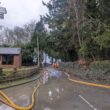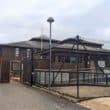????Gorse fire in Newry ????@NIFRSOFFICIAL pic.twitter.com/0qnaJgKddJ
— Justin McNulty (@JustinMcNu1ty) May 5, 2017
A staggering 204 gorse fires were reported across Northern Ireland in less than a week in May – with Lurgan station one of the busiest.
Ninety-two percent of those fires are believed to have been started deliberately with the north of Armagh in particular a trouble spot.
And the stats come just a day before a huge gorse fire in Newry; a blaze which threatened the safety of dozens of residents.
The Northern Ireland Fire and Rescue Service (NIFRS) is warning of the extreme dangers and serious consequences of deliberate fire setting in the countryside.
Scorched landscape shows the extent of the damage caused by gorse fire in #Newry last night @NIFRSOFFICIAL @bbcnewsline @Independent_ie pic.twitter.com/K1CyzeawJx
— Overheard In Newry (@OverheardNewry) May 6, 2017
Since Monday 1 Maythey have attended 221 gorse fires compared to 19 for the same period last year. 92% or 204 gorse fires attended this week were started deliberately.
The majority of these incidents (177) occurred in either our Southern (112) or Western (65) Area Commands. Downpatrick and Lurgan have been the busiest stations with 26 and 22 incidents respectively.
NIFRS is reminding everyone that dealing with these types of incidents puts not only Firefighters’ lives at risk but the lives of everyone in the local community and puts additional pressure on operational resources.
Area Commander, Maurice Rafferty explains: “The current spell of dry, sunny weather has provided a tinderbox landscape with conditions ripe for gorse fires to take hold. We have already dealt with the first gorse fires of the year so we are appealing to the public, and young people in particular, to support their fire and rescue service by acting responsibly.
“Tackling gorse and wildland fires is extremely challenging for us. It means deploying Firefighters and equipment to remote locations. This can be for prolonged periods of time with our Crews working under hazardous and intense heat to bring the fires under control. These fires can easily spread and even a slight change in wind direction can pose a serious risk to life, property and the environment.
“It’s not just the larger fires on hillsides and mountains that impact upon resources, the smaller fires involving grass and bushes also need to be dealt with quickly as they have the potential to spread and develop into bigger fires. Attending such incidents puts additional pressure on our people and our resources.
“We are appealing to everyone within the local community to be aware of the dangers and consequences of deliberate fire setting. It ties up our vital resources from other more serious incidents and potentially puts people and property at risk.”
.@NIFRSOFFICIAL has put out over 200 gorse fires since Monday. If you light one & someone dies – prison, longtime. Don’t ruin your life. pic.twitter.com/AELsBxvYFW
— Cllr Peter Martin (@petermartindup) May 6, 2017
While the majority of gorse fires attended by NIFRS are started deliberately they can also be started unintentionally by thoughtless and careless behaviour. Both deliberate and accidental fires can cost lives and NIFRS is asking that the public heed fire safety advice to protect themselves and the countryside.
* Extinguish cigarettes and other smoking materials properly.
* Never throw cigarette ends out of car windows.
* Only use barbecues in designated and safe areas and never leave them unattended. Keep children and ball games away from barbecues.
* Ensure that barbecues are fully extinguished and cold before disposing of their contents.
* Avoid using open fires in the countryside.
* Do not leave bottles or glass in woodlands. Sunlight shining through glass can start a fire. Take them home or put them in a waste or recycling bin.
* If you see a fire in the countryside, report it immediately to the Fire & Rescue Service. Don’t attempt to tackle fires that will take more than a bucket of water to put out. Leave the area as soon as possible.
* Report any suspicious behaviour to the Police.





